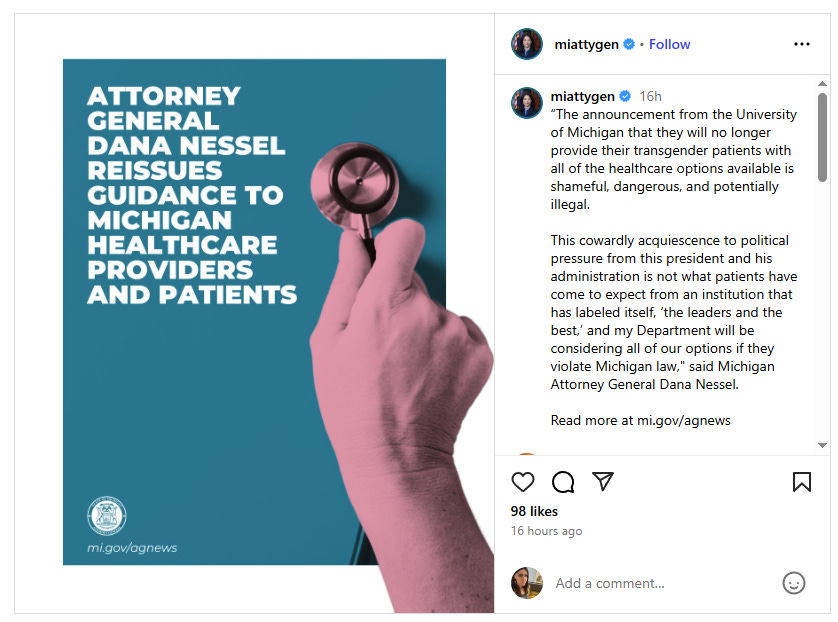Michigan AG Warns UM Hospitals Not To Capitulate Over Trump's Trans Ban, Calls Decision Likely "Illegal"
"My Department will be considering all of our options if they violate Michigan law."
In recent months, a growing number of hospitals in blue states have shuttered their gender-affirming care programs for transgender youth and young adults up to 19—not because of flaws in the care itself, which they have provided to thousands of patients without issue, but because of threats from the Trump administration. Rather than stand up to those threats and risk losing federal funding, these hospitals have chosen to abandon their transgender patients—an act many parents describe as outright capitulation, and one that likely violates state nondiscrimination laws. Until now, state attorneys general have largely limited their response to lawsuits against the administration, leaving hospitals free to wash their hands of responsibility. That changed this yesterday evening, when Michigan’s attorney general, Dana Nessel, issued a sharp warning to University of Michigan Health—the latest hospital to drop care for youth—that caving to Trump may itself violate state law, and that her office is prepared to use every option to bring the institution back into compliance.
“The announcement from the University of Michigan that they will no longer provide their transgender patients with all of the healthcare options available is shameful, dangerous, and potentially illegal,” Attorney General Nessel said in response. “This cowardly acquiescence to political pressure from this president and his administration is not what patients have come to expect from an institution that has labeled itself, ‘the leaders and the best,’ and my Department will be considering all of our options if they violate Michigan law,” read the statement from Nessel.
“This administration draws most of its power from the willingness of its targets to capitulate without a fight, abandoning their own principles and interests, and throwing disfavored populations under the bus,” Nessel continued. “Despite repeated successful legal challenges to actions by this administration, UM has chosen instead to sacrifice the health, well-being, and likely the very lives of Michigan children, to protect itself from the ire of an administration who, oftentimes, engages in unlawful actions itself.”
Word that University of Michigan cancelled its transgender care program for youth comes after a slew of executive orders issued by President Trump, as well as investigatory threats and funding cuts. Rather than fight for their transgender patients, many hospitals have chosen to comply, even in states where safe-state legislation was supposed to offer the promise of protection against a loss of transgender healthcare.
“This difficult and complex decision was made in response to unprecedented legal and regulatory threats against our institution and our employees, including threats of criminal and civil charges against our prescribing clinicians. Please know that we are committed to working with our patients/clients to ensure appropriate, individualized care plans. We will offer to meet individually with impacted patients/clients to explore options for ongoing care. We understand how impactful this change is. If you are uncertain about how this change might impact you or your clients/patients, please discuss this with your supervisor,” read the email informing staff of University of Michigan Health about their decision to end care.
Recently, the Trump administration has threatened hospitals with spurious charges of “female genital mutilation” or abuse of authority for prescribing gender-affirming care. At the same time, it has moved to withhold Medicaid funds from any institution providing such care. Crucially, these laws do not actually ban gender-affirming care for transgender youth—these are intimidation tactics based on a purposeful misreading of law that would not hold up in court—and when challenged, courts have rejected them. But litigation is expensive, and the process drags on. Some hospitals, like University of Michigan Health, have decided the fight is not worth the cost. They keep their funding and avoid a courtroom battle—at the price of abandoning transgender patients whose lives depend on that care.
Similar calculations are playing out at some of the nation’s most prestigious universities. Institutions like Penn, Columbia, and Brown have recently adopted anti-trans policies at Trump’s behest—policies that in many cases appear to violate state nondiscrimination laws. Their calculation is clear: they fear losing federal funding more than they fear the enforcement of state protections. The result is devastating. Transgender students who believed they were shielded by both the inclusive promises of their universities and the protections of blue state law now find themselves trapped, vulnerable, and targeted by the very institutions that promised to keep them safe.
State Attorneys General will play a decisive role in the months ahead in halting the wave of preemptive compliance with Trump’s anti-trans threats. Suing the administration alone is not enough; as we’ve already seen, it can simply pull another lever, delay, or repackage its demands until institutions fold. The real fight may not be just in court—but also in forcing universities and hospitals to obey the state civil rights laws already on the books. Michigan’s attorney general has shown one path forward: warning institutions directly that capitulation itself may be unlawful. If more AGs follow that lead, they could tip the balance, compelling schools and hospitals to resist rather than retreat, and ensuring that transgender lives are not treated as expendable bargaining chips.




Thank goodness. This is.
The sign that I and other michigan's have been waiting to see from Dana Nessel. I applaud her for taking a stand to protect the rights of our trans gender brothers and sisters.
Excellent. Would that Newsom had done the same. :spits: